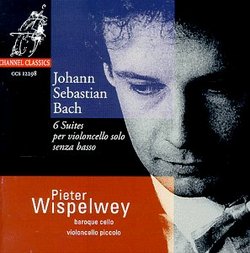| All Artists: Johann Sebastian Bach, Pieter Wispelwey Title: Johann Sebastian Bach: 6 Suites per Violoncello Solo Senza Basso Members Wishing: 0 Total Copies: 0 Label: Channel Classics Nl Release Date: 9/8/1998 Album Type: Import Genre: Classical Styles: Chamber Music, Historical Periods, Baroque (c.1600-1750), Instruments, Strings, Symphonies Number of Discs: 2 SwapaCD Credits: 2 UPC: 723385122982 |
Search - Johann Sebastian Bach, Pieter Wispelwey :: Johann Sebastian Bach: 6 Suites per Violoncello Solo Senza Basso
 | Johann Sebastian Bach, Pieter Wispelwey Johann Sebastian Bach: 6 Suites per Violoncello Solo Senza Basso Genre: Classical
|
Larger Image |
CD Details |
CD ReviewsThis is how Bach should be played B.E. ten Cate | THE HAGUE, THE NETHERLANDS | 07/02/1999 (5 out of 5 stars) "This is Wispelwey's second recording of Bach's cello suites. The first recording dates from the 80s, and in the future he wants to do a third recording. If you compare both recordings, you'll understand why. A comparison between the two recordings shows how Wispelwey matured and how his opinions changed as to how Bach should be played. This recording is not only played faster and less rigid than the previous one, it also played with more boldness. It's predecessor sometimes sounded a bit too hesitant. Again Wispelwey plays on a period instrument, which allows a vivid performance. This album won many international prizes. Listening to it, this should come as no surprise. This is my favourite performance of Bach's cello suites. I am looking forward to Wispelwey's third interpretation." Measured, spare, beautiful David Levine | Hopkinton, NH USA | 11/25/2000 (5 out of 5 stars) "I have four recordings of the Bach cello suites: Wispelwey, Casals, Yo-Yo Ma, and some played by Jacqueline Dupres. I love Casal's older recording. Casals plays with great abandon and fire; he felt that all Bach should be played as if by a gypsy. Ma's seems a bit unfeeling to me, somewhat rushed in places. Dupres is full of fire and both rhythmic and dynamic variations not necessarily in the music. A bit mannered and uncontrolled. I continually return to Wispelwey's wonderful music. His playing is restrained and measured, yet conveys a deep sensitivity to the music. His playing is dry, spare, unadorned and with little vibrato on a period instrument. What emerges is a fresh look at Bach, and a wonderful interpretation that seems to strike to the very essence of the music. Recommended above all others." Vigorous but refined David A. Beamer | Clawson, MI United States | 11/21/2003 (5 out of 5 stars) "For a work as popular as this, it's a wonder why most of the recordings are "modern" (Ma, Fournier, et al), and why there are so few "original instrument" recordings like this one. Wispelwey plays with imagination and vigor. An example of these traits (and perfectly in keeping with Baroque performance practice), is how he takes the final chords of the D minor Prelude, and instead of sitting on them (as is written), he plays a set of furious arpeggios on the chords. However, on the whole, the ornmenation is relatively subdued throughout.The sound quality of the recording is examplary. As a matter of fact, this is one of the only knocks I have against the recording -- it's miked so closely that you can hear Wispelwey pound the fingers of his left hand down onto the fingerboard. While this gives him excellent articulation, the slight thudding noise is a bit distracting. (And of course, the instrument is tuned almost a half-step low. Cellists with perfect pitch: beware.)His use of vibrato is very spare, which also follows the performance practice. At times he could use a teeny bit more warmth, for example in the famous Sarabande of the C minor suite. He seems to be downplaying the emotions of this simple yet profound movement. I prefer Ma's rendition of this movement (but, then, the movement is a special favorite of Ma's...).All in all, an excellent choice for an "original instrument" version of the Suites. Recommended."
|

 Track Listings (18) - Disc #1
Track Listings (18) - Disc #1